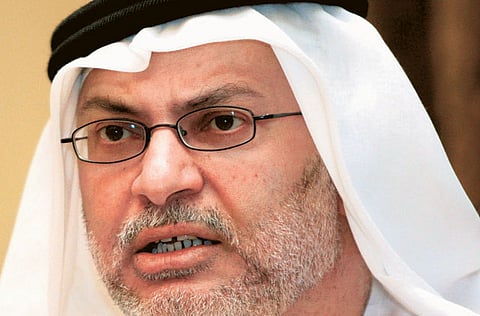Iran interference must stop before talks: UAE
Kuwait emir’s Oman visit believed to be liniked to dialogue issue

Dubai: If Iran wants dialogue with the Gulf Arab states, it must stop interfering in its neighbours’ internal affairs, the UAE has said in response to Iran’s call for a dialogue with Gulf states.
“[Iranian Foreign Minister Jawad] Zarif calls for a regional dialogue in the Arabian Gulf. For the dialogue to be serious and away from propaganda, Tehran must stop interfering in the internal affairs of its neighbours,” said UAE Minister of State for Foreign Affairs Anwar Gargash on Twitter.
During the Munich Security Conference on Sunday, Zarif said countries of the region need to surmount “the current state of division and tension” and develop a “realistic regional security arrangement”, calling for a regional dialogue.
“It can perhaps start with a modest regional dialogue forum, based on generally recognised principles and shared objectives. The forum can promote understanding on a broad spectrum of issues, ranging from confidence- and security-building measures to combating terrorism, extremism and sectarianism,” Zarif said in his address to the 53rd Munich Security Conference in Germany on Sunday, IRNA reported. “Such a forum could eventually even develop into a more formal nonaggression and security cooperation arrangement.”
Zarif’s call came after a visit by Iranian President Hassan Rouhani to Oman and Kuwait on Wednesday reportedly in connection with a January message by the six-member Gulf Cooperation Council relayed to Tehran through Kuwait, on their willingness to promote bilateral ties through dialogue.
Saudi Arabia’s foreign minister on Sunday rejected Iranian calls for dialogue saying Tehran was the main sponsor of terrorism in the world, a destabilising force in the Middle East and wanted to “destroy us.”
“Iran remains the single main sponsor of terrorism in the world,” Adel Al Jubeir told delegates at the Munich Security Conference. “It’s determined to upend the order in Middle East ... (and) until and unless Iran changes its behavior it would be very difficult to deal with a country like this.”
Al Jubeir said Iran was propping up the government of Syrian President Bashar al-Assad, funding Al Houthi separatists in Yemen and violent groups across the region. He said the international community needed to set clear “red lines” to halt Iran’s actions.
Despite its foreign minister’s outreach at the international forum on Sunday however, Iran on Monday lashed out at Saudi Arabia, accusing it of colluding with the Israeli regime to undermine it by creating an “international atmosphere” against Tehran.
Foreign ministry spokesman Bahram Ghasemi said the two countries “imagine they can compensate for their numerous defeats and failures in the region by creating an international atmosphere against our country.”
Meanwhile, Kuwaiti Emir Shaikh Sabah Al Ahmad arrived in Oman on Monday on an official visit that is believed to be connected to attempts to start a dialogue between Iran and the Gulf states.
— with inputs from agencies



